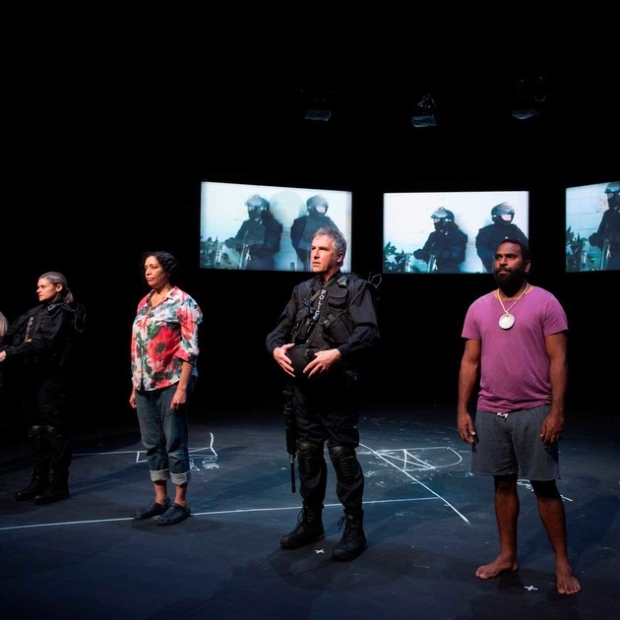Beautiful One Day (Southbank Centre)

© Ponch Hawkes
Great Palm Island sits off the coast of Queensland, beautiful and, seen from the mainland, remote. Its population, largely aboriginal, have a different view. To them, it is home.
In 2004, the island was beset by riots following the death of a local man, Cameron Mulrunji Doomadgee, in police custody. Its courthouse, police station and barracks were burned to the ground, before armed police moved in from the mainland. The pattern is horribly familiar. This could be Ferguson or Tottenham or Redfern.
Beautiful One Day, a documentary piece created with members of the Palm Island community, examines the escalation of those events. It’s careful with its context, threading Doomadgee’s death and its consequences into the island’s history: its years as a penitentiary, governed by the Aborigines Act of 1910, which imposed such severe restrictions on indigenous people. The cast list them in full: no traditional ceremonies, no homemade bikinis, compulsory STD checks – and much more besides. "No answering back. No asking why."
Made by ILJIBERRI theatre company in conjunction with the Belvoir, it is a piece that looks back to look forwards, hoping for a future that might make amends for the past. Its patient accumulation of facts and testimonials pays real dividends – particularly from the second act onwards.
That accounts for Doomadgee’s death itself. He was arrested for singing "Who Let The Dogs Out" at an officer. On a chalked flooplan of the police station, we hear the arresting officer Chris Hurley’s account of events: how he tripped on entering the station, fell to the floor and ripped Doomadgee’s shirt while trying to lift him back up. Doomadgee suffered four broken ribs, a cut above his right eye and internal bleeding. As Hurley maintains his innocence, the full extent of Doomadgee’s injuries emerges slowly. They’re consistent with a head-on car accident or a plane crash. His liver was cleaved in two by his spine. Hurley was acquitted.
Director Eamon Flack steers us through what follows with measured calm, removing the heat from a town meeting to tease out the reasoned arguments within. It bubbles into angry action, coolly described – arson and an armed mob – that is, in turn, quashed by riot police. Two black-clad figures appear onstage: balaclavas and eye-masks, body-armour and assault rifles. It is a shocking, shocking sight. These silent soldiers belong in apocalyptic computer games, not small island communities. Retaliation breeds retaliation – but it’s those deemed guilty of inciting the riot that get punished. Hurley, meanwhile, wins an insurance pay-out and claims expenses for damaged property.
If Beautiful One Day asks how society moves forwards, how it repairs and reparates for the past, it also serves as its own answer. One of its final filmed testimonials comes from a man whose vocal chords have been ruined, presumably by his alcoholism. He speaks with the help of a handheld machine, without which, he wouldn’t be able to tell his story and explain the disadvantage that led to his situation. As a show, Beautiful One Day does the same thing. It lets Palm Islanders tell their own story and it seeks to listen and to understand. That way change might follow.
Beautiful One Day ran at the Southbank Centre 24-25th July as part of Border Crossings’ Origins Festival.










